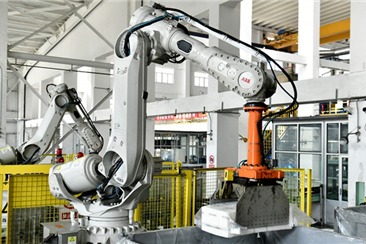Manufacturing, infrastructure set to bolster economy


Investment in the manufacturing and infrastructure sectors is expected to play a key role in stabilizing China's economic growth in the coming months amid intensified policy support, after retail sales and property development showed signs of softening, officials and experts said on Wednesday.
They commented after China's economic recovery slowed in August due to domestic COVID-19 cases and heavy rains in some parts of the country, with headline data including industrial output, retail sales and fixed-asset investment decelerating from July and falling short of market expectations.
Notably, year-on-year growth of retail sales slowed to 2.5 percent from 8.5 percent in July, which was attributable to suppressed offline activities and a high comparison base, the National Bureau of Statistics said on Wednesday.
"The foundation of economic recovery still needs to be consolidated," said Fu Linghui, an NBS spokesman.
Looking to the rest of the year, investment in high-tech manufacturing sectors, green projects like solar, wind and hydraulic power, and public projects to safeguard the housing of low-income households may become key buffers of rising economic headwinds, experts said.
More policy support may be in the pipeline for those sectors, to both offset near-term downward pressure and promote long-term agendas like common prosperity and green transition. In contrast, massive and broad stimulus measures are unlikely, they said.
Led by high-tech industries, investment in the manufacturing sector bucked the overall slowdown trend last month, rising 15.7 percent on a yearly basis and 3.3 percent on a two-year average basis during the January-August period, up from 3.1 percent in the first seven months of the year, the NBS said.
"Favorable factors are expected to sustain steady growth in the manufacturing sector," Fu said, adding that a continuous economic recovery, improving corporate earnings and policies to alleviate cost burdens have combined to bolster manufacturing investment.
"High-tech manufacturing will likely keep booming thanks to strong market demand and policy support and lead the two-year average growth of manufacturing investment to a faster speed," said Tang Jianwei, chief researcher at the Bank of Communications' financial research center.
Meanwhile, the country should step up fiscal support to stabilize infrastructure investment. "Completing the annual targets for local government special bond issuance and fiscal spending will give a significant boost to the economy," Tang said.
Growth in infrastructure investment remained subdued and came in at 2.9 percent year-on-year in the first eight months of the year, compared with 8.9 percent for total fixed-asset investment, NBS data showed.
Fu from the NBS said infrastructure investment will gradually speed up as construction starts on major projects in the 14th Five-Year Plan (2021-25).
Lan Zongmin, a researcher at the Development Research Center of the State Council, said investment projects in new energy industries and low-carbon technology and equipment may also bring in more growth opportunities.
Although the economy showed more signs of softening in August, the nation is expected to continue to implement property sector regulations aimed at stabilizing housing prices and developers' debt ratio, said Lu Ting, Nomura's chief China economist.
"We think the Chinese government is willing to shoulder some short-term pain to seek long-term gains," Lu said, adding that China may push forward the development of public housing, or projects to safeguard the affordable housing of low-income households.
NBS data showed investment in real estate development grew by 10.9 percent year-on-year during the January-August period, compared with year-on-year growth of 12.7 percent during the January-July period. Analysts attributed the slowdown to weaker housing sales and policy measures to reduce the level of debt in the sector.




































